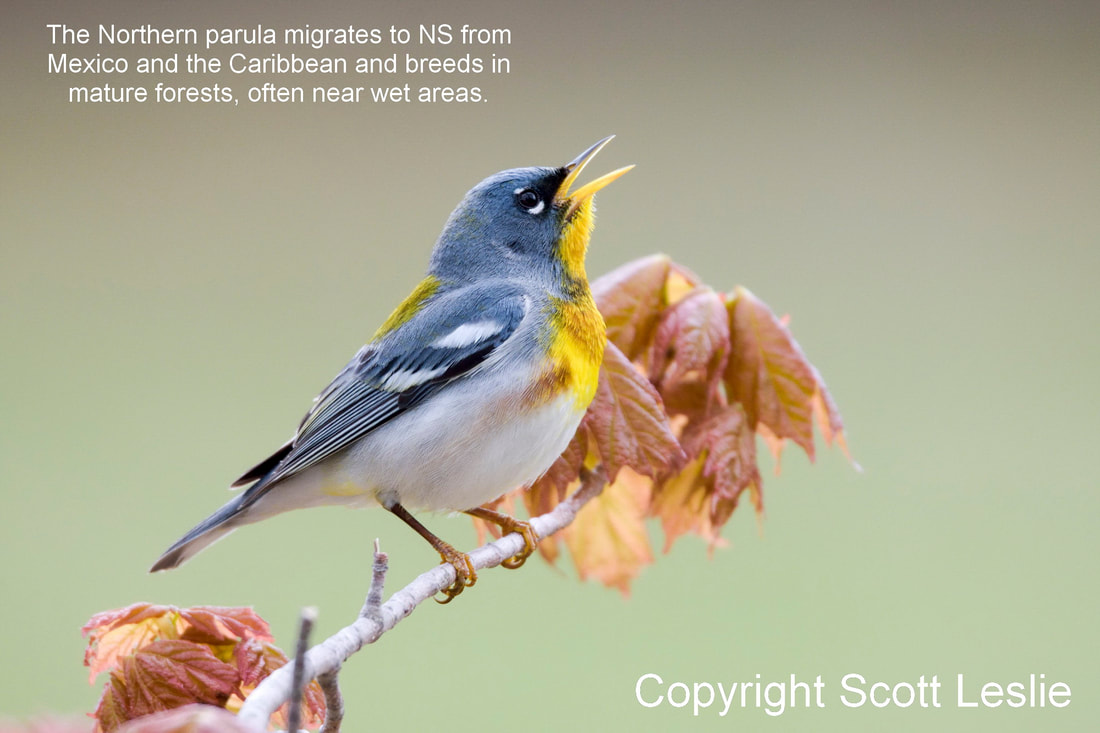 Every spring we welcome back literally millions of our feathered friends to Nova Scotia's forests. Birds of every shape, size, and colour appear at this time of year as though conjured out of thin air by the lengthening daylight. They herald the re-birth of a winter weary land as they fill with colour and song the tens of thousands of hectares of what remains of our industrially ravaged forests. All manner of them, from the tiny ruby-throated hummingbird to brilliant warblers to birds of prey, return from distant points in the hemisphere to find a breeding territory that for some species may be smaller than an acre. Many songbirds, though tiny enough to fit comfortably in the palm of a small child's hand, have made a perilous journey of thousands of kilometres from their wintering grounds in South and Central America, the Caribbean, Mexico or the southern US to get to Nova Scotia. When they arrive, they are hungry and thin from the near ceaseless activity of the long-distance flight. Yet, when they arrive they must find food, then begin the equally hard work of nest building, laying and incubating eggs, feeding and finally fledging their young. That they have succeeded in doing this for countless generations should inspire our admiration and respect for these amazing creatures! Yet, all is not well for these wonders of nature. Many of them finish the arduous trip north every spring only to find their home has been destroyed: the forest where they bred in previous years has been cut down while they were away over the winter. Even if this tragedy is averted, these newly arrived birds, along with their nests and their young, can be destroyed by commercial logging as they sit on the nest. That's because many loggers, among them large Nova Scotian companies, apparently pay no attention to federal and international law. The Migratory Birds Convention Act is meant to protect migrant birds during the sensitive breeding season. It states that it is illegal to destroy, disturb or harass birds or their nests during breeding season. But this law is not enforced at either the federal or the provincial level. Most logging used to take place in the winter. These days, huge machines clear cut forests, day and night, year round. To protect nesting birds effectively, we need a ‘silent season’ in the woods. That means no logging during breeding season. Countries around the world are adopting this practice. Here in Canada we need wider reform of forestry practices to reflect the incredible value of our forests, not just as an economic resource but as a vital home to biodiversity, so crucial in making the planet liveable for all of us. Let’s start by giving the birds a break. Scott Leslie is a professional wildlife photographer and writer who lives near Smith's Cove, Nova Scotia. He is an author of several books on nature, including a four-volume set on the birds of North America. His photography is represented by National Geographic Image Collection, among others.
0 Comments
Your comment will be posted after it is approved.
Leave a Reply. |
Blog Archives
October 2020
Blog Index
All
|
Photo used under Creative Commons from DaveW99999


 RSS Feed
RSS Feed
